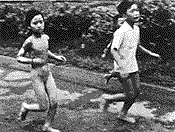Flame-breathing flying dragons scorching a city in Reign of Fire are analogous to the World Trade Center attacks. Disaster flicks are our primary cultural means of assessing the meaning of September 11’s cataclysmic images. These are two relatively benign examples of the lengths to which critics and commentators have gone in trying to make sense of the fateful day. Both come from essays published in the alternative press, but they could just as easily have originated in the dailies or with electronic media. The meaning of 9/11 is a secret that everyone wants to share. One year later is probably too soon to gain much long-range perspective, but that hasn’t stopped the barrage of opinion now reaching a crescendo all around us on the first anniversary.
At the local multiplex, though, we haven’t seen a thing. The saving grace of motion pictures in the rush to memorialize 9/11 is that they take so long to make. Don’t give Hollywood too much credit for forbearance and circumspection — soon enough we’ll see the first of the heroic New York firefighter movies. It’ll probably star Mel Gibson and have a Bruce Springsteen theme song. But it won’t be directed by Steven Spielberg. In an interview with CNN last June, the maker of Saving Private Ryan vowed that he would never make a movie about 9/11. If only we could get similar guarantees from Jerry Bruckheimer and Ridley Scott.
If they make them, will anyone come? A thumbnail analysis of domestic box office figures from five different weeks of the past year proved inconclusive. In mid-August 2001, a “more innocent time,” Rush Hour 2 was America’s favorite movie. The week of the attack, the box office and the entertainment business in general suffered severe drop-offs, while Variety reported on “Shell-Shocked Showbiz” and studios pushed back the openings of action films Collateral Damage and Big Trouble because of their content. Spider-Man had to have its World Trade Center scenes reshot. Two months later, in mid-November, the harmless kiddie pic Monsters Inc. opened with a bang, but a gloomy mood had spread across the entertainment landscape. Whether that was attributable to 9/11, the dot-com collapse, massive corporate layoffs, or the weak economy in general is open to interpretation. By late April 2002, it was business as usual, with costumed adventure The Scorpion King racking up $36 million in its first week. And, almost a year after the attacks, extreme-sports star/spy Vin Diesel was merrily busting heads in xXx on his way past the $100 million mark for Sony.
In short, nothing much has changed. Some exhibitors report they aren’t showing as many action films as a year ago. That may be, but a recent look at the ten top-grossing movies (for the weekend of August 23-25) showed a pretty typical end-of-summer roster: an extraterrestrial thriller (Signs), the aforementioned violent spy actioner xXx, a children’s comedy sequel (Spy Kids 2), a romantic comedy aimed at women (My Big Fat Greek Wedding), a cheesecake youth-market romance with a little action (Blue Crush), a standard-brand rom-com (Serving Sara), another spy comedy sequel (Austin Powers in Goldmember), a violent prison actioner (Undisputed), a sci-fi-ish drama about a computer-generated actress (Simone), and a Clint Eastwood actioner, Blood Work, proving that there are some things you can always count on. The take added up to what the Internet Movie Database called “the dreariest weekend of the summer — or any summer since 1998” at the box office. Was it 9/11, or just bad movies?
While all this was happening in the mass marketplace, thoughtful films like Kandahar, Baran, and the documentary Jung (War): In the Land of the Mujaheddin — films that had more to do with the actual causes and effects of 9/11 — came and went quietly in the art houses, playing to those were who interested, presumably the same folks who rushed into bookstores and bought books on Islam and the Arab world in the aftermath of the attacks, trying to understand. The permanent war on terrorism so far has not produced anything like the home-front propaganda dramas of WWII (Bataan, Hangmen Also Die, etc.). That sort of stuff went out of fashion in the Vietnam era. One 2001 big-studio release, Black Hawk Down, did relate very directly to the background elements of 9/11, but only in an us-against-them military action context.
September 11 was “about” different things. From the Third World/have-not viewpoint, you could sum up that message cinematically as a response to Gunga Din, The Charge of the Light Brigade, Lawrence of Arabia, The Man Who Would Be King, and all the other movies in which white Europeans bamboozled the wogs and johnnies. From the skeptical American point of view, one could read the lessons of 9/11 from any one of a long list of “ugly white man” films: The Searchers, Wall Street, Year of the Dragon, Aguirre: The Wrath of God, Apocalypse Now, or even, as long as we’re in the realm of metaphor, Citizen Kane. The most recent of these might be Three Kings; evidently we weren’t ready for what it had to say about petro-industry-driven American adventurism. If we were feeling peevish, we could say that if Americans had been paying attention to these films and what they say about us, 9/11 might never have happened. America, the corporation (as opposed to America, the people) didn’t learn very much from 9/11. Nor did it absorb the lessons of the Vietnam war, Watergate, the “October Surprise,” Iran/Contragate, the S&L scandal, the Gulf War, or any of the USA’s reckless forays into Somalia, Sudan, Iraq, Afghanistan, etc. Americans hate history, the old saying goes. We hate it at the movies as much as we hate it on TV — unless it’s violent and exciting.
The best film so far about 9/11 is a two-part package of shorts, Underground Zero, produced by Bay Area filmmakers Jay Rosenblatt and Caveh Zahedi, who include works of their own among the 31 mostly introspective titles by experimental artists. It played the Fine Arts for a week in May, and is now making the festival rounds. Underground Zero is relentlessly uncommercial and rigorously subjective, but one of the better straightforward documentaries is 9/11 by James Hanlon, Gédéon Naudet, and Jules Naudet, a “we were there” first-person account of the heroics of an NYFD engine company at the World Trade Center — which aired on CBS.
The big-studio releases that opened in first-run theaters on September 6, the week of the first anniversary, are City by the Sea, a father-son crime drama starring Robert De Niro, and a youth-market thriller, Swimfan. No special commemoration in evidence there. So stay at home, light a candle, or read a book, and volunteer for a voter registration drive. Or catch up on your movie viewing. On the recommended list, in addition to the films mentioned above: Gillo Pontecorvo’s The Battle of Algiers (1965), a thrilling docudrama study of a revolution against imperialism; Hearts and Minds, Peter Davis’ brilliant 1974 documentary on the Vietnam war; and on the allegorical side, Y tu mamá también by writer-director Alfonso Cuarón, a subtly wrought critique of the cruelties of the free market, and one of the very best films of 2002. You might also throw in Spielberg/Philip K. Dick’s Minority Report, for a glimpse into John Ashcroft’s permanent-war mentality. But you can no doubt make your own 9/11 must-see list. Peace.
















